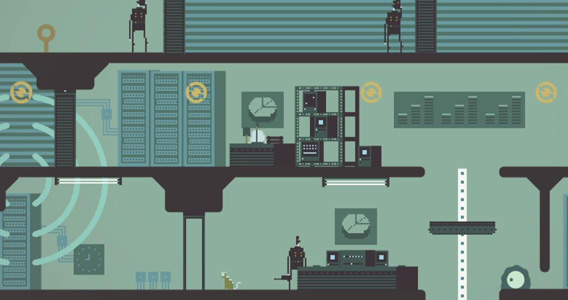
Have you ever really lamented leaving a coin behind?
I mean, when we need some money to pay the shopkeeper, or find ourselves forced to collect every coin in order to complete a level or win a challenge, we begrudgingly do those things. But if I only grab two coins while fumbling through a Mario stage, it’s hardly something that keeps me from leaping toward the flagpole and moving on to the next stage.
Maybe there was a time when I attempted to collect all the rings with Sonic, but forever abandoned the idea after getting hit by an enemy and watching them all shoot across the screen – that’s trickle-down economics for you!
But Queasy Games’ Sound Shapes, released earlier this year, offers up something rather brilliant in the realm of obsessing over every collectible, despite the very real risk of repeated failure on the part of the player. Each stage starts in relative silence, save for the strange rhythmic chants of critters sparsely spread throughout the environment.
Collecting a coin adds a musical note to the proceedings, the everyday visual subtraction of a collectible object earnestly bringing the stage to life for the trouble, and visually replaced by the beating pulse of the note in time with the evolving score. In this way, the idea of suddenly leaving any coin behind robs the landscape of its full potential, denies the player a complete harmony at the finish line, and necessitates that no note be left unplayed – a grand recalibration of want and need on a subject that has lazily floated its existence between the tediously obligatory and the entirely optional.
With most rhythm games, missing a few notes is no big deal; the song continues and the chance to improve remains intact. But here there’s a demand for completion.
Simplicity is at the core of mechanics continually capable of boundless elasticity, offering stages wrapped in albums that all deliver distinctly unique sensations with the same tool set. You can experience the chill Zen tactile pleasure and you can have the retro flavored platforming challenge within the same framework.
And then there’s the entirely fresh thesis of Corporeal, a contribution from Superbrothers that cements the achievement of Toronto’s collaborative development space – tracks that place players within soulless corporate spaces to discover beats and rhythm while traveling to the hellish heart of some lost idea of conformist machinery. The trip is something of a beautiful nightmare, grasping at some idea of what the structure of society looked like to a six-year-old version of myself.
A lot of people will tell you that Sound Shapes turns music games on their ears, but it’s difficult to know what that means without stealing some quiet space and time with the game. Its full intent hasn’t been easy for me to divine since its release, but I’m scratching at some idea of exploring the relationship between sounds and the sources that create them, an earnest attempt to enable players to feel what they hear and vice-versa.
Persona 4’s candy pop aesthetics may well be the Vita’s saving grace this year, but Sound Shapes represents something more enduring for the soul ,with a thesis on sound and play that offers a fresh path toward undiscovered territory in lands generally considered barren.
